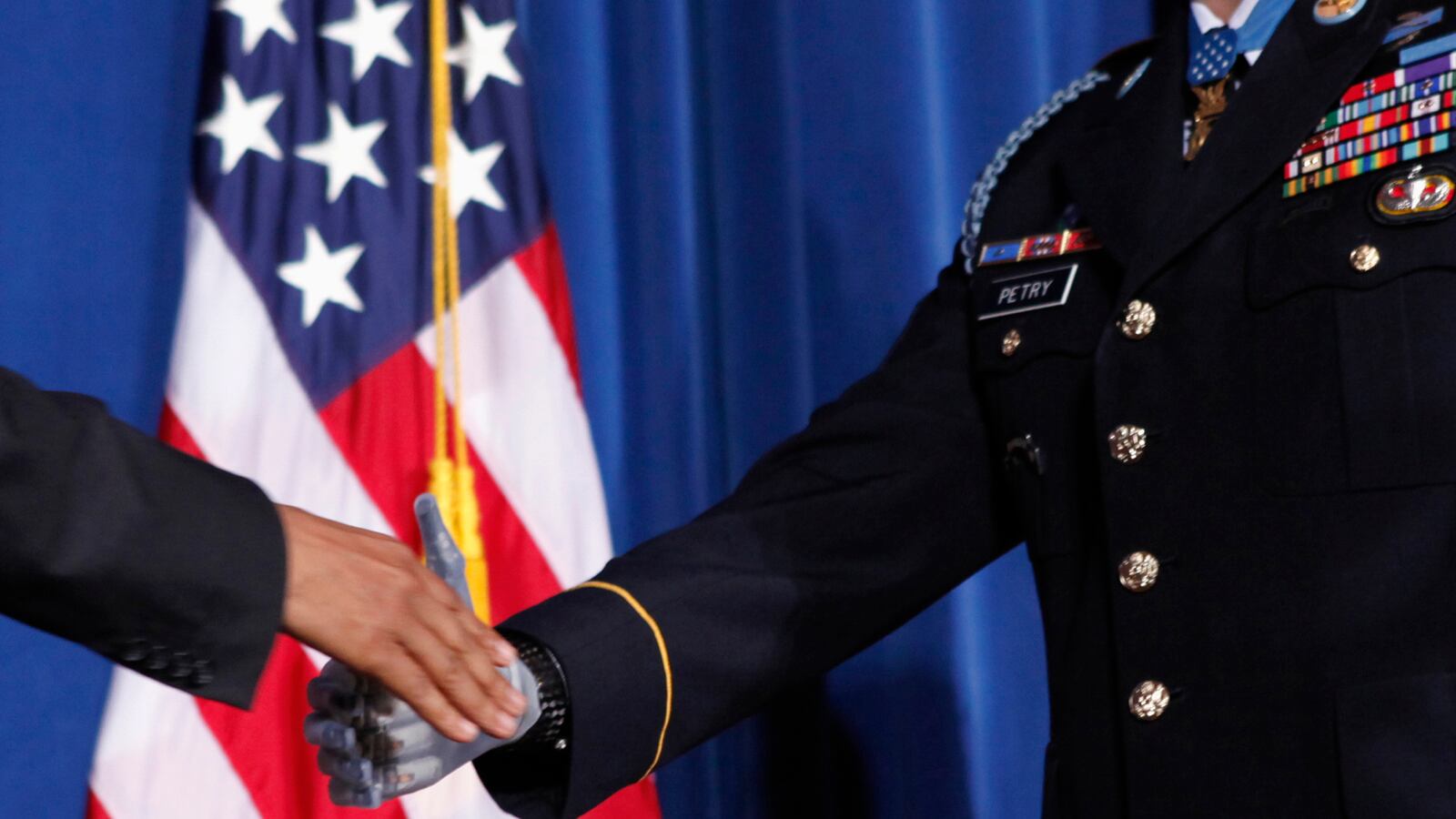In the spring of 2005, after my army unit’s return from Iraq, I found myself on stage in a converted Fort Hood chapel to receive a military award for valor. Several other awardees stood at attention beside me. We looked out at the faces of our fellow cavalry troopers, the men in the audience who were not so lucky as to get a medal that day. I knew for a fact, because I had seen it, that some of them had done the exact same thing I had, but would not be receiving any formal recognition for it. One of those men, I recently learned, has had trouble convincing the VA that he served in Iraq at all.

Correcting similar injustices, last week President Obama awarded the Medal of Honor to a group of 24 veterans whose valor in conflicts from World War II through Vietnam had been slighted by institutional bigotry. Those who received these awards clearly deserved them, but righting past wrongs doesn’t fix our current problem: last week’s historical Medals of Honor represent almost twice the total number bestowed upon Iraq and Afghanistan veterans over more than a decade of fighting.
The system for military awards is broken. We have become closefisted with the top valor medals to the point of being miserly, even as we reduce other awards—like the Bronze Star for service, which is basically given to anyone who holds high rank in a combat zone—to meaninglessness through proliferation. These shortcomings and other problems with the military awards system will likely be addressed later this year in a comprehensive review ordered by Secretary of Defense Hagel, himself the recipient of two Purple Hearts.
Back in 2005, when I received my own award, my pride was tinged by a sense of the capricious system that had chosen me and not others. Ribbon pinned on my chest, I could read respect in some of my buddies’ faces, and jealousy in others. It’s a tough thing to be singled out and even tougher to be passed over. But the prevailing emotion that day, even among us awardees, was a bemused sense of boredom, restlessness and insatiability. Compared to where we had just been, what we had so recently done, all the pomp and circumstance seemed ingratiatingly trivial.
Besides, we had all spent enough time in the army to know how the awards system really worked. In equal parts bureaucracy and meritocracy, our chances of receiving a medal—and not just the select few awards for valor but any old medal—depended as much on the willingness of our superior officers to advocate on our behalf as it did on any objective measure of merit. To be recognized took more than just bravery in combat; it depended on a superior who could write well and compose a convincing award recommendation, on the quality of that superior’s relationship to his own boss, who would have the approving authority, on the willingness of a unit’s leaders to revise and resubmit their awards paperwork if, as was often the case, they were at first denied—in short, we all knew that military awards, like any human endeavor, were intensely political. They depended on who you were and whom you knew at least as much as what you did.
Yet, in spite of its arbitrariness, I am proud of my award. Medals are figments, make no mistake, but at the same time these symbols can carry with them the weight of life and death. They stand in for what is real. Sacrifice, bravery, blood, and futility: medals, or the lack of them, are part of a story we tell ourselves about our national heroes.
If you believe the official count, there have been surprisingly few in 12 years of war in Southwest Asia. The number of Medals of Honor awarded to Iraq and Afghanistan veterans currently stands at 13, with another imminent later this year. In contrast, 137 such awards were made during the Korean War, and nearly twice that many during Vietnam.

In those two conflicts and in other major 20th century wars, the rate at which the U.S military bestowed the Medal of Honor stayed fairly constant: one award for about every 40,000 wartime troops. However, in our current state of perpetual warfare, this rate—rather than increasing—has dropped dramatically, with one Medal of Honor awarded for every 177,000 who served in Iraq or Afghanistan.
The discrepancy in these figures is not for lack of fighting. Viewed as a percentage of those wounded in action, the contemporary rate of Medals of Honor is even more a statistical anomaly. During the Vietnam War the number of awardees represented 0.16% of those wounded in action; in Afghanistan that number has decreased to 0.05%, and in Iraq the figure stands even lower at 1/100th of one percent of those wounded.

Why so few post-9-11 Medals of Honor? Is it something about the morality or the politics of these particular wars and the way they have been fought, which renders traditional notions of valor less apparent? Is it a failure of the modern Defense Department, yet another of the many lapses in leadership that have characterized this era? Or, has the rank-and-file military’s idea of heroism changed over time, becoming more stringent in the age of the all-volunteer force?
The answer, perhaps unsatisfyingly, is complicated. In some respects our recent wars are substantially different from those past. Iraq, especially, saw insurgents rely on roadside IEDs to inflict casualties on the U.S. military with minimal exposure to themselves. Facing down an unseen enemy and deadly supply routes, one should be considered brave today who drives the same stretch of highway that yesterday killed a comrade. But you won’t see anyone getting a valor medal for that: in Iraq it was called doing your job.
To be sure, there were plenty of old-fashioned gunfights in Baghdad, but then again, these usually fleeting engagements took place in a crowded city where it was hard to see who was shooting at you. Battle, always chaotic, was made even more so by the lack of clearly defined sides and objectives. In an urban gunfight against irregular forces, the bravest man is the one who doesn’t pull the trigger so readily, thereby putting himself at risk for fear of the civilians he might inadvertently hit. Again, you will see no military awards made for valorous discretion in combat.
The men who have received Medals of Honor for their actions in Iraq and Afghanistan performed traditional acts of bravery like jumping on grenades, and running through enemy fire to save their friends. It's unquestionable that they rate their awards. Sadly, their families are typically the only ones left to commend, since most of the awardees are dead. President Bush awarded no Medals of Honor that were not posthumous, and while President Obama has broken that unfortunate precedent, the award has remained a striking rarity under his administration.
Finally, a kind of self-reinforcing stinginess perhaps best explains the lack of Medals of Honor. Once any distinction becomes so sacred as to be almost never conferred—when the bureaucracy is so full of itself, so overcautious and ponderous that Medal of Honor applications are thick as phone books, and potential awardees vetted with a rigor normally reserved for top officials—it is hard to revert back to an earlier way of thinking, to see the Medal of Honor as something our peers are as capable of earning as were their grandfathers. To keep with the purpose of these awards they must not be given carelessly, but they must be given. There have been too many deserving candidates for it to be any other way.






